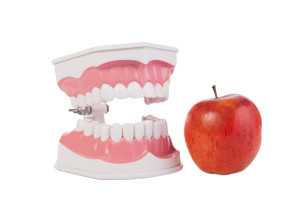Which Denture is the Right Denture for You?

Your dentist’s primary goal in caring for your teeth and gums is to help you keep your natural teeth for a lifetime. Tooth loss or necessary extraction sets the stage for ongoing problems. That’s why prompt action is recommended to replace a missing tooth or teeth. One of the most common ways this is achieved is with dentures or a dental bridge. Here, we discuss the various types of dentures so you can determine which may be right for you.
Types of Dentures
Several factors may cause tooth loss. Whatever the cause, dentures can be a good option for restoring chewing and speaking function. A partial denture may be considered when a few teeth need to be replaced. A fixed dental bridge may also be suitable in such cases. Full dentures, as implied by the name, are customized to the mouth to replace a full set of top or bottom teeth.
A fixed dental bridge is a restoration that requires the stability of surrounding teeth. To fit a dental bridge, the dentist creates crowns for two teeth. That means that they need to be reduced so the crowns fit over them. An artificial tooth called a pontic is bonded in between the crowns so, when the crowns are affixed to their teeth, the artificial tooth is secured in the empty space between.
A partial denture is also customized, similar to a dental bridge. This restoration, however, has an acrylic base that looks like gums and is stabilized with small clasps that grasp onto surrounding teeth. Both a dental bridge and a partial denture need particular care to ensure bacteria do not accumulate in small spaces.
Full dentures have artificial teeth set in an acrylic base that fits over the gums. Because complete tooth loss is often followed by bone degradation, full dentures typically need to be adjusted every so often. Maintaining dentures in this way decreases the likelihood of slipping and rubbing on the gums. An option that can be added to full dentures, and even larger bridges, is to secure them onto dental implants. Dental implants are small titanium cylinders that are inserted into the jawbone. The procedure is painless thanks to local anesthesia. After the cylinders are situated, the bone grows around them so they do not wiggle or shift. Because dental implants encourage ongoing bone regeneration, this is a preferred option for many patients.
Let’s Restore Your Smile
If you have suffered tooth loss or need to have teeth extracted, we are here to help you rebuild a smile that looks and feels natural. Call (703)-935-2879 to schedule your visit to our Burke office.







